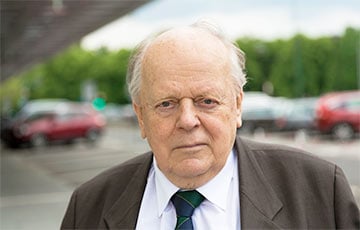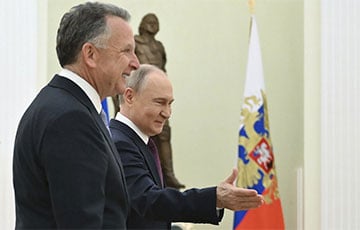"We Were Denied Eastern Cemetery Burial Place"
- 18.05.2022, 12:32

PHOTO: CHARTER97.ORG
Iryna Shushkevich told about her husband's last days and farewell circumstances.
Two weeks after the death of Stanislau Shushkevich, Radio Svaboda asked his wife Iryna to remember the last days of the first leader of independent Belarus and the circumstances of his burial.
The last two years, since the beginning of the coronavirus, Stanislau Shushkevich spent in self-isolation in his apartment and left it only for medical reasons.
In one of the last interviews, he said that he walks three thousand steps around the apartment every day, and before he walked ten thousand. We asked Iryna Shushkevich if this was true, maybe he meant the street, not the apartment.
“Yes, he used to walk around the apartment,” Iryna confirmed. — He calculated how many steps there were from one balcony, in the living room, to the second, in the study. And so he walked from balcony to balcony. He liked to have a result. The doctors told him to walk three kilometers a day for his heart. So he walked. Then he faced problems with his feet... Unfortunately, it turned out that when he was laying, his head hurt less, and his feet were better, he felt no pain. And for his heart, on the contrary, it was necessary to walk. And he walked. He had an iron will in this regard. I asked him to live, and not leave me alone. It was necessary to move for this, and he moved. He was a good man”.
Shushkevich followed political news and read a lot despite his state of health.
“After he underwent cataract surgery, he had wonderful sight, well, like a young one. Therefore, he began to read more on the computer, where it was possible to make a font of any size."
According to his wife, recently Shushkevich recalled poems by Blok, Lermontov, and Nekrasov. “He read Bykau, but I can’t remember what exactly, because he read it on a computer, and not in a paper version,” Iryna clarified what Vasil Bykau meant, although, according to her, Shushkevich loved Dmitry Bykov, the Russian writer.
“He also tried to edit 'My Life: The Collapse and Resurrection of the USSR', his book. At first he said that it might be worth changing something, but then added “no, everything is fine”, and gave up this business.
As Iryna Shushkevich says, her husband tried to write in his last days: “He was worried that his hand-writing had gotten worse, he even asked me for help. I put a board for him, but he already managed only in block letters, he didn’t like it.”
“I blossomed, I thought everything would be fine,”
Stanislau Shushkevich contracted coronavirus despite self-isolation, which led to a deterioration in health.
“These were the covid consequences,” says Iryna Shushkevich. He had many chronic diseases, they all worsened. He was in intensive care twice. Then, after the second time of intensive care, it seemed to me that he felt better. I gave him cocoa for children, then there was a protein cocktail for athletes before the second time in intensive care. I understood that he was leaving, then he was taken to intensive care. He was able to eat solid food after intensive care. I agreed with the resuscitationist, he came and said that he had good muscles, the muscles remember the movements and it is possible to have him on his feet.
Iryna Shushkevich purchased a special medical bed and placed it in a living room:
“He called this bed “technical” for some reason. — I said that this is not technical, this is medical. And he wanted his usual one. But it was hard to take care of him in an ordinary bed. Earlier it lay on the usual, and it was very difficult to care. Therefore, we purchased such a bed, and put it in the center of the living room. It seemed to him that he was not yet at home and that he needed to go home. But then he saw that he was at home. I think he just felt bad, but at home it's always better. He wanted it to be better. I tell him: "Look, you're at home!" - “Oh, yes, at home!”
They promised to come from the hospice three times a week to do the necessary procedures for bedridden patients, but Iryna Shushkevich, according to her, could do it herself, as she used to take care of her bedridden mother.
“I blossomed, I thought everything would be fine,” says Iryna. — But on May 3rd he had breakfast and refused to eat. Then his stomach hurt, I called an ambulance, they came and gave him a drotaverine injection. I didn’t like something, I called, they explained to me how to raise the pressure. I tried, but I saw that the pressure was dropping more and more, he felt short of breath. I called an ambulance again. This ambulance arrived already with oxygen, with some other suitcases. They said it was unlikely to be a good result."
When I asked if Stanislau Shushkevich was conscious during the last hours of his life, Iryna replied that while she was in the room, yes. “But then I was asked to leave because of the resuscitation.”
The procedures lasted about an hour, at 23.35 the doctors pronounced him dead.
Why was the place of burial not announced for a long time?
Iryna Shushkevich says that they discussed the last farewell and burial in the family.
“We talked about it with him. Then he asked to be buried in the Eastern Cemetery, there is an alley of scientists (he was a corresponding member of the Academy of Sciences).
It can be assumed that Shushkevich counted on eternal rest where he was supposed to be according to his merits to Belarus. There is a place in the Eastern Cemetery where academicians are buried, it is the so-called “Honorary Alley”, but actually it is the area on the left side of the main entrance, where not only outstanding scientists, but also literary and artistic figures are buried: Uladzimir Karatkevich, Vasil Bykau, Stefania Staniuta, Uladzimir Muliavin. Previously, high-ranking communist leaders were also buried here, now it is close to Lukashenka officials or even their wives. Nikalai Dziamentei and Vyachaslau Kebich are buried here.
Unconditionally, it is the right place for the first leader of independent Belarus to be buried. In any case, the government, if it has at least any respect for the country it leads, was obliged to offer Shushkevich's family this place.
The administration of the Eastern Cemetery replied that they would comply with any decision that the higher authorities make. Formally, permission for burial at the Eastern Cemetery is given by the head of the Minsk City Executive Committee, but it was clear that Lukashenka would decide in this case.
“We contacted both the Presidential Administration and the Minsk City Executive Committee," Iryna Shushkevich recalls. Everyone was waiting for the decision (that's why the place of burial was not announced for several days), but they did not give us a place at the Eastern Cemetery. At the end of last year, my own sister died, there was a place nearby, and we buried him there. But it turned out that it was not very far from his sister, close to his mother, and not far from my parents."
"I loved Belarusians best of all"
Iryna Shushkevich says that the medics called the police immediately after the death of Stanislau Shushkevich to fulfil all the official procedures. In the morning, Iryna Shushkevich went to the medical commission for a death certificate. A bit later, she received a call and was told they could provide a memorial hall. But without transportation: "You must bring the body and take it on your own."
“Since we discussed this, he said that it is better not to make any ceremonies at the Academy since it deprived him of payments due to a corresponding member,” says Iryna. — Everybody got it, but he didn't.
We did not expect any help from the state, so we decided that the memorial hall would be on Alsheuski Street, there are two of them, one smaller, the other bigger. We chose the bigger one. I told the one who called from the medical commission that we would be on Alsheusky Street. "Oh, well, please."
However, later Iryna Shushkevich remembered that there had been a funeral service for Aliaksandr Kazulin's wife in the Red Church: "And we came there. We were told yes, of course. But then they said that since he handed over the Cathedral to believers in his time (and by the way, when we happened to pass near the cathedral, believers often thanked him), they decided that they would be buried in the Cathedral. We did not think, we couldn't even imagine such a thing."
Iryna Shushkevich sees symbolism in the fact that the funeral service took place in the Cathedral on the Freedom Square. She expresses her gratitude to the Catholic priests and to everyone who came to Stanislau Shushkevich's farewell, and excitedly recalls the speech by Tadevush Kandrusievich:
“I don't think any public burial would have gone better than the one that took place at the Cathedral. I am very grateful to the Catholic Church, to all the people whom I know and whom I do not know, who treated the memory of my husband with such respect. He respected all nations: Russians, Ukrainians, Moldavians, everyone, but he loved Belarusians best of all. This is not nationalism, but it was patriotism.”
According to Iryna Shushkevich, she remains in Belarus.
“I don't want to leave the country. And he didn't want to go anywhere. He believed that he should be in his motherland, no matter what happens to the homeland. I want to say that he really did everything: he built a house, he planted a tree, he has a daughter and a son. And most importantly, he was very reliable. We completely trusted each other. So it's really hard for me now. He was in a hurry everywhere, he managed to do everything. Unfortunately, he left so fast. I wanted him to have more time”.
When asked if any of the representatives of state bodies expressed condolences to her on the death of her husband, Iryna Shushkevich answered in one word: "No"
***
The memorial mass for Stanislau Shushkevich will take place on May 21 at 19:00 in the Red Church.










